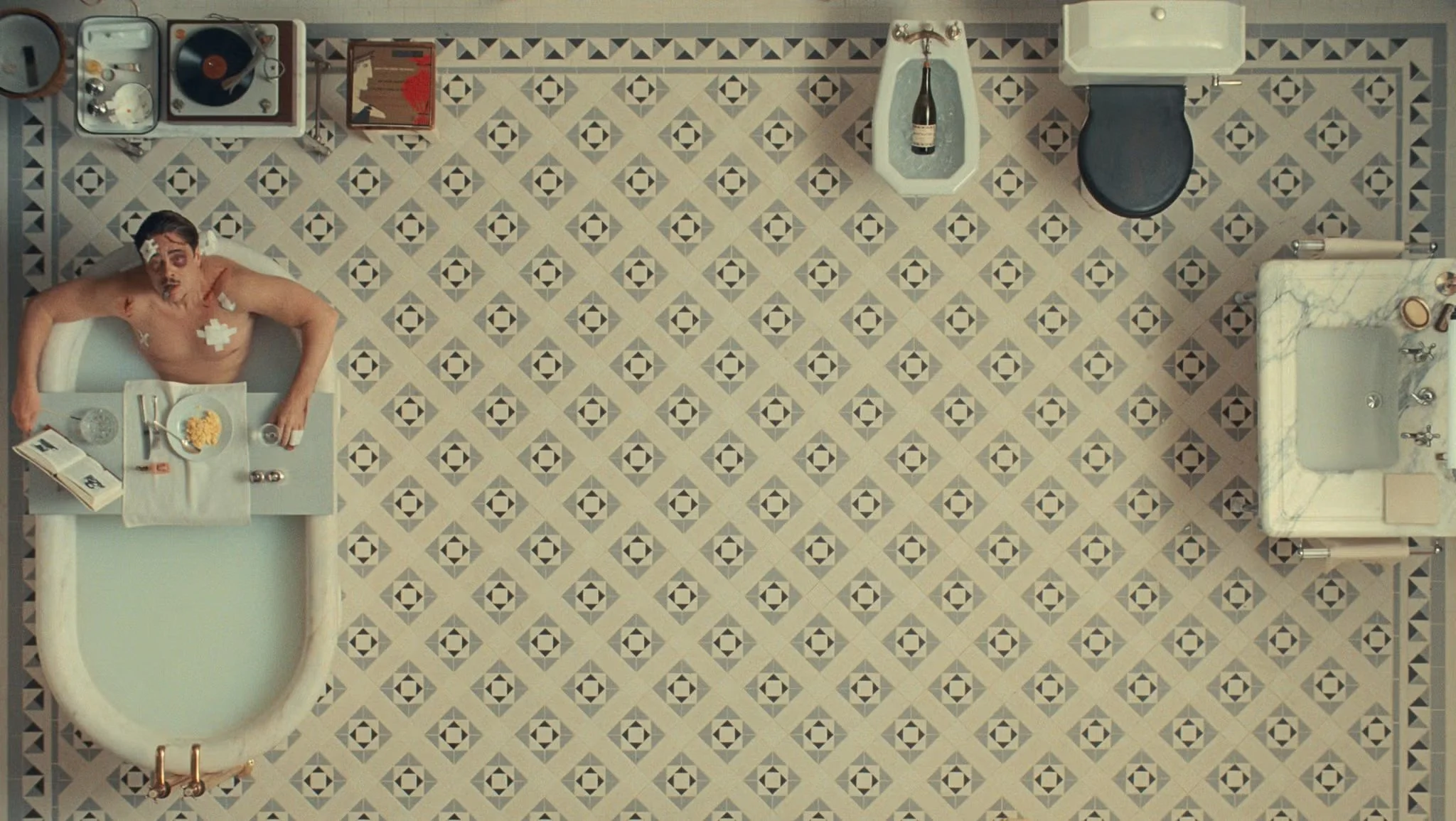The Phoenician Scheme: Perhaps Too Perfect a Film
★★★★☆
Four out of Five Stars
The Phoenician Scheme is Wes Anderson’s latest addition to his considerable collection of adult storybook films in which all elements bear his signature style and coalesce perfectly in service of his unique vision. Without a doubt, the film is yet another example of a master filmmaker in full control of his powers. However, perhaps it is nostalgia talking or a desire to cooly, but lamely say “his earlier work is better,” but I yearn for his earlier, deeper, messier films. They were not perfect, but he tried things that didn’t always work. The films felt authentic. Since The Grand Budapest Hotel, his films feel too perfect and safe.
Wes Anderson exclusively works in ornate doll houses these days. All films are doll houses, but no director works in them to the extent that Anderson does. Doll houses, especially Wes Anderson’s, are beautiful, but the true masterpieces that come out of doll houses are chaotic, daring, and full of emotion.
Zsa-zsa Korda is another in a long line of Anderson’s “Bad Dads.” A wealthy businessman, arms dealer, and industrialist, Korda is a man of no nation and solely concerned with the success of his business dealings. In the opening scene, Korda jettisons the pilot of his sabotaged airplane and crash-lands it. Despite reports to the contrary, Korda has survived his sixth assassination attempt. During this latest brush with death, he visits the afterlife, where a divine court passes judgement on his worthiness to enter Heaven. From this near death experience, Korda begins to feel mortal in a way the other assassination attempts didn't and wants to name his only daughter (amongst nine sons) his sole heir, despite her current vocation as a nun. Despite her reluctance, Sister Liesl joins Korda on his adventure to make up the budget shortfall for his Phoenician scheme to overhaul the infrastructure of Phoenicia with slave labor. Characteristically, this quest takes them through a procession of quirky characters and beautiful, unique locales.
Like all of Wes Anderson’s recent films, the costume design, production design, special effects, cinematography, and score are all top notch. As is customary with a Wes Anderson film, nothing is out of place. The acting is the typical deadpan, which serves certain situations better than others and some actors are more adept at using it to their advantage and letting emotion seep through. In Wes Anderson’s later period, Ralph Fiennes in Grand Budapest, F. Murray Abraham in Grand Budapest, Tom Hanks in Asteroid City, and Edward Norton in Asteroid City are the standouts in bringing true pathos to their roles. Here, Benicio del Toro shines and allows emotion to seep through the veneer. Mia Threapleton as Sister Liesl left a bit to be desired in her performance. Richard Ayoade and Michael Cera should absolutely be in every Wes Anderson film going forward.
The script is clever and the wit lightning quick. If your mind wanders for a second, you may miss a joke or even a plot point. The dialogue is delivered with the rat-a-tat of an old school radio broadcast. Wes Anderson continues to be a master of comedic timing and physical comedy. It’s hard to imagine laughing at a man cut off at the torso, but I did. There’s something about extreme violence in a twee environment with deadpan reactions.
The film is excellent. It’s perfect. It’s almost suspiciously perfect. But there is something missing from this film that has been missing from much of Anderson’s latest films. Soul and daring. Wes Anderson is undoubtedly a master and weaves an excellent tale. He has his filmmaking almost down to a science. I love his tackling of different genres in his style: coming-of-age with Moonrise Kingdom, caper with The Grand Budapest Hotel, science-fiction with Asteroid City and Isle of Dogs, anthology and newspaper with The French Dispatch, and now espionage with The Phoenician Scheme. It’s all fun. I would love to see a Wes Anderson horror film or sports film or gangster film or whatever genre he so chooses.
However, I wish he would direct his powers in service of something more unique and daring than he has in his recent films. Since Fantastic Mr. Fox, Wes Anderson has perfected Wes Anderson and become even more Wes Anderson, sometimes to the point of parody. All of his films since Fox have been incredibly enjoyable, entertaining, and well-crafted works. He knows what he wants to create and achieves it perfectly.
But at this point in his career, it’s hard to imagine Wes Anderson making something as flawed and touching as The Life Aquatic with Steve Zissou, his most imperfect film, or as deep and moving as The Darjeeling Limited, his most underrated film. I cannot imagine a scene in current Wes Anderson as affecting as Peter Whitman carrying the dead body of the drowned Indian boy in Darjeeling or as heart-piercing as Richie Tenenbaum’s suicide attempt or as beautiful as Steve Zissou’s final encounter with the jaguar shark. None of Anderson’s early films are perfect, but they are entertaining and moving. Most importantly, they each represent an attempt at something new and daring. With many of his latest films, he appears to have resisted evolution. When there is evolution in his films, there is something very controlled and sterile about it. And that’s not truly evolution.
Since Fox, Wes Anderson has not made a film that takes place in the present-day. He seems content to play in his midcentury doll house and I don’t blame him. None of the living legendary directors besides David Fincher set films in the present day. Perhaps it’s cell phones or social media or politics dissuading them. I don’t know. But I would love to see Wes Anderson messily return to the present day. The film may not be as pristine as his latest works or as technically excellent, but I worry that we may never get a film like Rushmore or The Royal Tenenbaums from Wes Anderson again.


